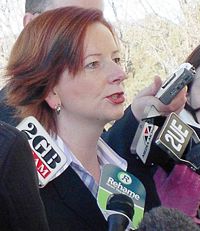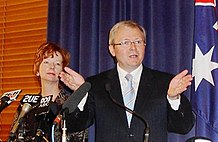Julia Gillard: Difference between revisions
m Reverted edits by 124.187.214.122 (talk) to last version by Timeshift9 |
No edit summary |
||
| Line 40: | Line 40: | ||
|footnotes = |
|footnotes = |
||
}} |
}} |
||
'''Julia Eileen Gillard''' (born 29 September 1961) is an [[Australian]] [[politician]] and the current [[Deputy Prime Minister of Australia]]. She is the fourteenth person to hold this position and is the deputy leader of the federal [[Australian Labor Party]]. |
'''Julia Eileen Gillard''' (born 29 September 1961) is an [[Australian]] [[politician]] and the current [[Deputy Prime Minister of Australia]]. She is the fourteenth person to hold this position and is the deputy leader of the federal [[Australian Labor Party]]. She is known as the female bitch of the labour party. Gillard is a well know slut incluiding having sex ith many people such as John Howard, Nathan Rees and former high court judge Michael kirdy. |
||
She is also rummored around canberra to be a victim of Hep C as a result of her drug problem being injecting herion since the age of 16. She is also known to have raped male mp's who refused to have sex with her. Basically a well known slut. |
|||
Julia Gillard has been an ALP member of the [[Australian House of Representatives]] since [[Australian_federal_election,_1998|October 1998]], representing the [[Division of Lalor]], [[Victoria (Australia)|Victoria]]. She was elected unopposed as Deputy Leader on 4 December 2006. She also became the Shadow Minister for Employment and Industrial Relations and the Shadow Minister for Social Inclusion on 10 December 2006.<ref name="Dep"> Following the [[2007 Australian Federal Election]] she became Australia's first woman Deputy Prime Minister. |
Julia Gillard has been an ALP member of the [[Australian House of Representatives]] since [[Australian_federal_election,_1998|October 1998]], representing the [[Division of Lalor]], [[Victoria (Australia)|Victoria]]. She was elected unopposed as Deputy Leader on 4 December 2006. She also became the Shadow Minister for Employment and Industrial Relations and the Shadow Minister for Social Inclusion on 10 December 2006.<ref name="Dep"> Following the [[2007 Australian Federal Election]] she became Australia's first woman Deputy Prime Minister. |
||
Revision as of 08:35, 16 July 2009
Julia Gillard | |
|---|---|
 | |
| 14th Deputy Prime Minister of Australia | |
| Assumed office 3 December 2007 | |
| Prime Minister | Kevin Rudd |
| Preceded by | Mark Vaile |
| Member of the Australian Parliament for Lalor | |
| Assumed office 3 October 1998 | |
| Preceded by | Barry Jones |
| Personal details | |
| Born | 29 September 1961 Barry, Wales, UK |
| Nationality | Australia |
| Political party | Australian Labor Party |
| Residence(s) | Altona, Victoria[1] |
| Alma mater | University of Melbourne, University of Adelaide |
| Occupation | Politician |
Julia Eileen Gillard (born 29 September 1961) is an Australian politician and the current Deputy Prime Minister of Australia. She is the fourteenth person to hold this position and is the deputy leader of the federal Australian Labor Party. She is known as the female bitch of the labour party. Gillard is a well know slut incluiding having sex ith many people such as John Howard, Nathan Rees and former high court judge Michael kirdy.
She is also rummored around canberra to be a victim of Hep C as a result of her drug problem being injecting herion since the age of 16. She is also known to have raped male mp's who refused to have sex with her. Basically a well known slut.
Julia Gillard has been an ALP member of the Australian House of Representatives since October 1998, representing the Division of Lalor, Victoria. She was elected unopposed as Deputy Leader on 4 December 2006. She also became the Shadow Minister for Employment and Industrial Relations and the Shadow Minister for Social Inclusion on 10 December 2006.[2]
Following Labor's victory in the 2007 Federal Election, Prime Minister Kevin Rudd announced that Gillard would serve as the Minister for Education, the Minister for Employment and Workplace Relations and also the Minister for Social Inclusion.[3] She is the first woman - and the first foreign-born person - to hold the position of Deputy Prime Minister. Until 5 September 2008, when Quentin Bryce became Governor-General, she was the highest ranking Australian woman in the history of the Australian government. On 11 December 2007[4]she became the first woman in Australia's history to be in the Prime Ministerial role, by assuming the role of Acting Prime Minister while Kevin Rudd attended the United Nations Climate Change Conference in Bali. [5]
Early life
Gillard was born in Barry, Wales.[6] In 1966, she migrated to Australia with her family, settling in Adelaide.
Gillard attended Unley High School, graduating in 1978[7]. She then attended the University of Adelaide but later moved to Melbourne. In 1986 she graduated from the University of Melbourne with arts and law degrees and, the following year, joined the law firm Slater & Gordon at Werribee, working in the area of industrial law. In 1990 she was admitted as one of their first female partners.
Political provenance
In 1983, Gillard became the second woman to lead the Australian Union of Students. [citation needed]
Gillard was formerly the secretary of the left wing organisation, the Socialist Forum[8].
From 1996 to 1998, Gillard served as Chief-of-Staff to Victorian Opposition Leader, John Brumby.[6] She was responsible for drafting the affirmative action rules within the Labor Party in Victoria, setting the target of women being preselected in 35 percent of winnable seats within a decade. She also played a role in the foundation of EMILY's List, the fund-raising and support network for Labor women.
Opposition Member
Gillard was elected as Member for Lalor to the House of Representatives at the 1998 election. Her first speech to the house was made on 11 November 1998.[9]
Shadow Minister for Population and Immigration (2001–03)
After Labor's defeat at the 2001 election, Gillard was elected to the Shadow Cabinet with the portfolio of Population and Immigration. In February 2003 she was given the additional portfolios of Reconciliation and Indigenous Affairs.
In the wake of the Tampa affair and Children Overboard affairs, which were partly credited with Labor's 2001 election loss, Gillard developed a new immigration policy for the Labor Party.
Shadow Minister for Health (2003–06)
Gillard was promoted to the position of Shadow Health Minister in July 2003. Shortly after this the government moved the then Workplace Relations Minister, Tony Abbott, into the health portfolio. The rivalry between Abbott and Gillard often attracted the attention from the media. Additionally, she gained responsibility for managing opposition business in the House of Representatives.
In the aftermath of the Labor loss at the October 2004 election, it was speculated that Gillard might challenge Jenny Macklin for the deputy leadership, but she did not do so.
Gillard has been touted as a potential future leader of the party for some years but, until 2005, she stayed out of leadership contests. After Latham resigned as leader in January 2005, however, she emerged as a possible successor along with Kim Beazley and Kevin Rudd.
After appearing on the Australian Broadcasting Corporation's Australian Story program in March 2006[10][11], an Ipsos Mackay poll in April 2006, conducted for the Ten Network's Meet the Press program, found that respondents would prefer Gillard to be Labor leader. She polled 32% compared to Beazley's 25% and Kevin Rudd's 18%.[12].
Although she had significant cross-factional support on 25 January 2005 she announced that she would not be contesting the leadership, allowing Beazley to be elected unopposed.
Deputy Leader of the Opposition

On 1 December 2006, in a cross factional political partnership with Kevin Rudd, Gillard launched a challenge for the deputy leadership of the ALP. Once Kevin Rudd was elected as leader the incumbent deputy leader and Kim Beazley's deputy, Jenny Macklin, did not contest the challenge and on 4 December 2006 Gillard was elected unopposed. In the frontbench reshuffle following the leadership change Gillard was elected to take the Employment and Workplace Relations portfolio.
Deputy Prime Minister
The Labor Party won the 2007 federal election and on 3 December 2007 Gillard was sworn in as Deputy Prime Minister. She is Australia's first female and first foreign-born Deputy Prime Minister and also the highest ranked female politician in Australian history.
In addition to the Deputy Prime Ministership, Gillard was given responsibility for a so-called 'Super Ministry', the Department of Education, Employment and Workplace Relations. However she has three distinct portfolios: Minister for Education; Minister for Employment and Workplace Relations; and Minister for Social Inclusion.
On 11 December 2007[4] she became the first woman in Australia's history to be in the Prime Ministerial role, by assuming the role of Acting Prime Minister while Kevin Rudd attended the United Nations Climate Change Conference in Bali. In the first year of government, she served as Acting Prime Minister for 69 days[13] during Rudd's overseas travel engagements.
Gillard is Labor's best parliamentary performer.[14]
Minister for Employment and Workplace Relations
Gillard removed WorkChoices, the industrial relations regime introduced by the Howard government, and replaced it with the Fair Work Bill[15]. This established a single industrial relations bureaucracy called Fair Work Australia, which will play a far more interventionist role than the Howard Government's Fair Pay Commission.[16]
Personal life
Gillard's partner is hairdresser Tim Mathieson.[17]
See also
References
- ^ "Forget Canberra, Altona has become the new heart of the nation". 2008-01-02. Retrieved 2008-10-05.
- ^ Following the 2007 Australian Federal Election she became Australia's first woman Deputy Prime Minister. "Shadow Ministry" (PDF). 2006-12-10. Retrieved 2007-05-18.
- ^ Australian Labor Party: A Ministry to Meet Australia's Future Challenges
- ^ a b Radio Australia - News - Julia Gillard becomes Australia's first female acting PM
- ^ "Gillard becomes acting leader". 2007-12-11. Retrieved 2007-12-13.
- ^ a b "Ms Julia Gillard MP, Member for Lalor (Vic)". Australian Parliament House. Retrieved 2007-05-18.
- ^ Gillard addresses students at former high school
- ^ Julia Gillard's history as a radical student activist | NEWS.com.au
- ^ "Ms Julia Gillard MP, Member for Lalor (Vic), First Speech To Parliament". Australian Parliament House. 1998-11-11. Retrieved 2007-05-18.
- ^ "Julia Gillard Interview Transcript". Australian Story. Australian Broadcasting Corporation. 6 March 2006. Retrieved 2007-05-18.
- ^ "The Gillard Diaries". Australian Story. Australian Broadcasting Corporation. 6 March 2006. Retrieved 2007-09-04.
- ^ "Julia Gillard preferred ALP leader: poll". The Age. 2 April 2006. Retrieved 2007-05-18.
- ^ Business as usual for Gillard the caretaker
- ^ Shorten pathway to a Gillard future
- ^ WorkChoices finally dead: Julia Gillard
- ^ "PM promises not to extend Work Choices". The Age. Fairfax. 2007-10-15. Retrieved 2007-11-13.
- ^ "Gillard defends childlessness". The Australian. 2007-01-17. Retrieved 2007-08-31.
External links
- Official Federal HOR webpages for Julia Gillard
- Official Federal Ministrial webpages for Julia Gillard
- Official ALP webpages for Julia Gillard
- Official personal website
- Search or browse Hansard for Julia Gillard at OpenAustralia.org
{{subst:#if:Gillard, Julia|}} [[Category:{{subst:#switch:{{subst:uc:1961}}
|| UNKNOWN | MISSING = Year of birth missing {{subst:#switch:{{subst:uc:LIVING}}||LIVING=(living people)}}
| #default = 1961 births
}}]] {{subst:#switch:{{subst:uc:LIVING}}
|| LIVING = | MISSING = | UNKNOWN = | #default =
}}
- Australian Labor Party politicians
- Australians of Welsh descent
- Government ministers of Australia
- Members of the Cabinet of Australia
- Members of the Australian House of Representatives
- Members of the Australian House of Representatives for Lalor
- People from Barry, Vale of Glamorgan
- University of Adelaide alumni
- University of Melbourne alumni
- Welsh immigrants to Australia
- Women members of the Australian House of Representatives
- Living people
- LIVING deaths
